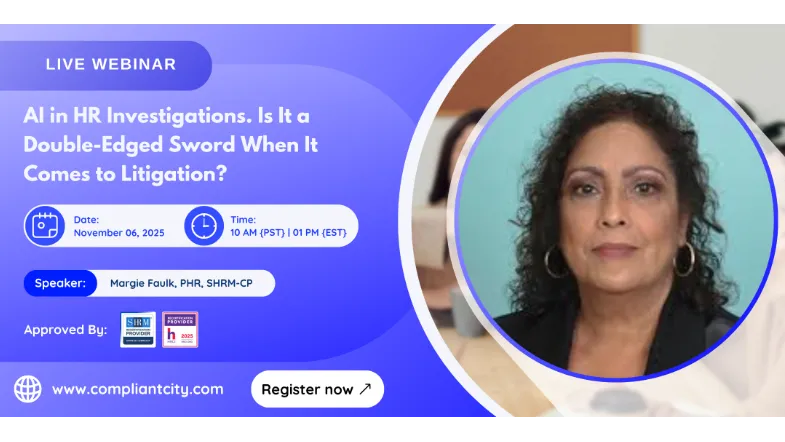AI in HR Investigations Is It a DoubleEdged Sword When It Comes to Litigation
The term “artificial intelligence” might be the phrase of 2025. It’s written and spoken about virtually everywhere by practically everyone, and it essentially markets itself as the newest, shiniest, and most efficient tool for every industry to consider and put into practice.
But the term “artificial intelligence” is quite broad. The definition of AI is broadened even further when considering that different technologies can be combined to create new AI systems. Despite the ever-expanding definition of AI, it is important to take inventory of the different types of AI to determine which, if any, is best suited for a workplace investigation.
How AI Can Help in Workplace Investigations
- Data management, analysis, and pattern recognition. Deploying AI in a workplace investigation can streamline an often long and intensive process by organizing, synthesizing, and digesting large amounts of data.
- Because AI tools are analyzing documents while sorting, an investigator can employ searches to identify information such as patterns, involved parties, and problematic documents, allowing for the creation of visual timelines of the event.
Compliance Considerations and Concerns with AI
- State laws, federal laws, and discrimination liability.
- Some states have started to enact legislation that regulates the use of AI in the workplace, many of which require consent by employees before deploying a program and require regular maintenance of the programs.
- In addition, the U.S. Equal Employment Opportunity Commission issued guidelines reinforcing the principle that investigators can be held liable for discrimination, even when it results from the use of AI.
Why Should You Attend:
Investigators using AI in employment investigations continue to expose themselves to liability under the Fair Labor Standards Act, Family and Medical Leave Act, and Employee Polygraph Protection Act, depending on the recommendation resulting from the investigation. Employers need to be aware of how they utilize AI in the workplace will determine their liability and litigation impact.
Areas that will be covered during the Session
- Learn what the AI impacts and concerns are by Employers in terms of liability
- Learn what the obstacles are when Employers and professionals use AI for onboarding, hiring, and performance reviews
- Learn how AI is used during investigations and how they are impacting the investigation process
- Learn what legal implications are when using AI for investigations, which can be an obstacle when using AI data for litigation purposes
- Learn how the Department of Labor (DOL) and the Fair Labor Standards Act (FLSA) will review the data submitted for
- Learn what tools will be instrumental when using AI in the workplace
- Learn how having the “Human Element” when using AI for investigations and other workplace compliance initiatives is mandatory when using AI in the workplace
- Learn what policies Employers need to have in place when using AI in the workplace
- Learn how informing employees that Employers use AI should be a mandatory process
Who Should Attend?
- All Employers
- Business Owners
- Company Leadership
- Compliance professionals
- HR Professionals
- Managers/Supervisors
After the live event, there will be a Q&A session where you can ask a question directly to our expert speaker. They will provide a clear and understandable response to help you better understand the topic.
Note: After completing your webinar purchase, please check your spam/junk folder in your email for the webinar joining link, which will be sent after the confirmation email.
Explore how Artificial Intelligence is transforming HR investigations. Learn about its potential benefits in efficiency and accuracy, as well as the legal and ethical challenges it presents. The session will discuss real-world applications, compliance implications, and best practices for balancing AI tools with human oversight.
Online
Register Now:-

This session explores how Artificial Intelligence (AI) impacts HR investigations, highlighting both the advantages and the legal risks. It focuses on maintaining compliance, managing bias, and preparing for potential litigation.
This webinar is designed for HR professionals, compliance officers, business owners, legal teams, and company leaders involved in employee relations or investigations.
Yes. Attendees can earn 1.5 SHRM PDCs and 1.5 HRCI CEU credits upon completion of the session.
You can purchase the recorded version, MP3, or e-transcript. All options include full access to the session content and resources shared by the speaker.
The session will be conducted by **Margie Faulk, PHR, SHRM-CP**, a senior HR compliance expert with over 15 years of experience in managing investigations, employee relations, and workplace compliance programs.
By attending this session, you’ll gain valuable insights into how Artificial Intelligence is reshaping HR investigations and what that means for compliance, ethics, and litigation. Key takeaways include:
• Understanding how AI can enhance the speed and accuracy of HR investigations
• Identifying potential legal and ethical risks associated with AI use in HR decision-making
• Learning how to maintain human oversight to prevent bias and ensure fairness
• Exploring current and emerging regulatory requirements around AI in the workplace
• Implementing best practices to balance technology-driven investigations with compliance standards
You’ll also receive practical compliance tools and resources designed to help you integrate AI responsibly within your HR processes.



 Alert
Alert